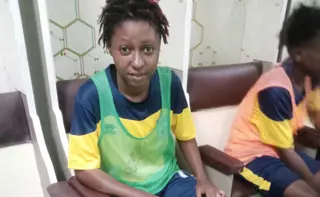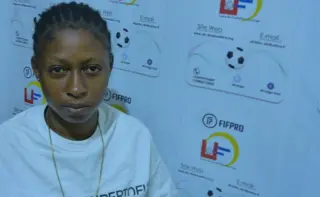Player Story
Illegal border crossings, false promises and non-payment: A warning about football in Congo

Making a living is difficult for professional women’s players in the Democratic Republic of Congo (Congo-Kinshasa). Some try their luck in neighbouring Republic of the Congo (Congo-Brazaville) but, according to the Union des Footballeurs du Congo (UFC), that is not without risks.
An example of how women’s players have been treated in DR Congo was visible in a video that emerged two years ago of U-20 players having to train in the street, kicking balls while cars drove by and sleeping outside as the football federation (FECOFA) failed to arrange a training pitch and a hotel.
Seeking better career opportunities, some women’s players leave without informing their club or the football federation, enter the Republic of Congo illegally, and are thus not registered as players. One of those was Vanessa Pemba, who now plays for DR Congo side MCF Bilenge. Last year, she tried her luck in Congo-Brazaville. She shared her experiences to warn other players about taking the same risk.
By Vanessa Pemba
In Kinshasa, the difficulties I encountered weren't as glaring as you might think, even though I was short of means to meet all my needs and those of my family. My business wasn’t booming, for example.
All of this led me to go to Congo-Brazzaville, in the hope of earning some money. I thought this could help reignite my business and help me support my family. However, my move to Brazzaville turned out to be a real mistake. And the little money and savings I had vanished into thin air.
This is unacceptable. pic.twitter.com/x86nhj32H8
— FIFPRO (@FIFPRO) October 14, 2021
I left Kinshasa for Brazzaville at the suggestion of a friend. They convinced me that I could get by there, thanks to the money they pay players, and that my stay could be profitable if I signed a lucrative contract. Without much thought, I took the bait in the hope of changing my life.
I went with a group of women’s players who were also selected by a club in Brazzaville. We made a clandestine journey, simply because we didn't have the necessary identity papers. In a canoe, we crossed the Congo River at Maluku, on the eastern outskirts of Kinshasa. The crossing took us nearly three hours, and I was as scared as I'd ever been in my life. It was an inhuman experience that I hope I’ll never have to endure again.
When we landed on the other side of the Congo River, on Brazzaville soil, we were met by a delegation from the club, which first took us to the team headquarters, before putting us up in a local hotel. The day after our arrival, they moved us to a rental house, where we stayed for over two months as part of a group of seven players.
Once I got to Brazzaville, nothing matched up with what this friend had said; things were very different. At first, the club’s president treated us like his children, but over time events took a negative turn, as the situation worsened day by day to the point where we ran out of things to eat or drink due to a lack of money. Getting dressed had also become a major worry; I had not brought many clothes with me as I had thought I would be able to buy some in Brazzaville with the money I would be earning.

The only money I had received was 25,000 CFA (approximately 40 USD), which was a small part of my signing bonus. The president promised that we would receive the rest of our signing bonuses, but that never happened.
As I was still registered as a player in my own country, I couldn’t be registered in Congo-Brazzaville under my own name. However, the club let me play under a new identity. I only played six matches, apparently because the coach had no idea how to play me. Other players from Kinshasa played more regularly. When we won, we were entitled to a match bonus equivalent to six USD.
With no solution to our problems in sight, I asked the president for a return ticket, but what followed was nothing but empty promises. And then the president vanished. We didn’t know where to turn.
I turned to an aunt who put me in touch with my uncle in Pointe-Noire, the country’s second biggest city, some 500 kilometres away from Brazzaville. From time to time, he sent me a bit of money for food. I was lucky that I met my uncle, he helped me a lot.

While I was looking for a way out of Brazzaville, I met a Good Samaritan during a football tournament. This lady took care of me until I was ready to go home seven months later.
Once I obtained my yellow vaccination card, I returned by canoe, once again crossing the Congo River. At the border of DR Congo, I was able to identify myself with my electoral card, which I had carried with me and works as an identity card.
My time in Brazzaville should teach other players a lot. I am not only talking about us players, but also about the DR Congo football federation (FECOFA). The latter should be keeping a close eye on the welfare of the players and working hard to ensure that transfers are carried out in accordance with the required standards.
We, the players, are advised to stop taking such risks, but FECOFA receives financial resources from FIFA for funding the development of women's football in our country. It is up to FECOFA to make good use of these resources to invest and help advance women’s football in our country. They should take away the desire of women’s players to leave: the players should desire to play at home and avoid these risks.
